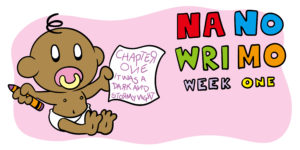Recently I gave a resounding ‘yes’ to the question ‘should I enter a writing competition?’ It’s a fantastic way to hone your craft with result-orientated work, and a great way to get your name out to prospective agents, publishers and readers. With that in mind it seems only fair to also answer the question ‘which competitions should I enter?’
That’s why, in this article, I’ve collected five of the best writing competitions for authors looking to make a name for themselves. Though they vary a little, whether it’s by subject or prize, each one is guaranteed to be worth your time.
#5 – Kindle Scout Writing Competition
This successor to the Amazon Novel Breakthrough Award utilizes the Amazon Bookstore to get new authors published. It starts with the submission of a book title, a précis and some other minor information. If your book is approved then you’ll begin a thirty day campaign, with real readers voting for your work. The great thing is that you can join in with the process, drumming up support through social media (there aren’t many writing contests that let you court the voters).
Winners can receive a Kindle Press publishing contract for their ebook, and their work will be considered for print publication. Winning entries also benefit from featured Amazon marketing – one of the most successful booksellers in the world will be trumpeting your work.
The best thing about this contest is that it’s a continuous process, so your own experience will only last 45 days from beginning to end. That’s an incredibly quick turnaround for such an amazing prize.
The competition is only open to never-before-published works of romance, mystery, sci-fi, fantasy, action, contemporary fiction and historical fiction. The competition is always running, so there’s no deadline; submit when you’re ready. I’d advise authors to not just prepare their work, but to have a social media campaign ready to boost their numbers.
You can find out more here.
#4 – The Spark Anthology
Spark is a quarterly anthology publication which accepts poetry, flash fiction, short stories and creative non-fiction. A win means publication in the anthology, which counts many influential industry personalities amongst its readership.
Spark are open to never-before-published work of any genre, but they will reject stories on the grounds of explicit sex, violence or language. They’re also particularly snotty about fan fiction, citing the potential legal complications and an odd story about a toy boat, so those who like to write in a copyrighted universe should look elsewhere. They’re also oddly strict about what counts as ‘previously published’ – basically if it can be found using Google, Spark aren’t interested (though they admit that regular submitters earn the right to be considered on a ‘case by case’ basis).
To be in with the best shot, writers should take note of Spark’s bohemian attitude to things like genre and medium (creative non-fiction is described as ‘the beautiful union of exposition and literature’), so those with an esoteric bent are likely to fare well. In fact, Spark are very open about the type of work they’re looking for, and the smart writer will scour their advice before submitting.
You can find out more here.
#3 – Writers of the Future Writing Contest
- Ron Hubbard’s Writers of the Future Contest may boast a pretty controversial namesake, but the tri-monthly contests offer three prizes of $1000, $750 and $500 – on top of an annual $5000 additional grand prize – and are adjudicated by professional authors. In terms of wowing agents and publishers there are few awards which will do more for you.
The Writers of the Future contest is only for short stories and ‘novelettes’ in the sci-fi or fantasy genre, but with no entry fee and no transfer of publication rights anyone who thinks their story might just fit the bill has nothing to lose. There’s a cap of 17,000 words and contestants can’t be ‘professional writers’, but the good news is that this definition is quite generous, even specifying the minimum payment they feel defines the position.
If all that wasn’t enough to convince you, this is probably the only major writing contest where winners also receive a trophy.
You can find out more here.
#2 – Graywolf Press Non-fiction Prize
This is the least regular but highest-paying writing competition, with winners taking home a $12,000 advance on a publishing contact with Graywolf. As the name suggests, the contest is for non-fiction and focuses on authors who are not-yet-established in the genre.
Graywolf are interested in innovative writing (‘we want to see projects that test the boundaries of literary non-fiction’) and warn that straight memoirs are likely to do poorly. Rather than finished stories, Graywolf are interested in unfinished manuscripts, and place a great deal of importance in nurturing and encouraging artists to find the best form of their work.
Both judges and former winners are particularly prestigious, so this isn’t a competition to enter on a whim, but if you’ve got a non-fiction project that you think could be special with a little help then this is the competition for you.
Find out more here.
#1 – Writer’s Digest Annual Writing Competition
Beloved by such visionaries as Homer Simpson, the Writer’s Digest boasts one of the oldest writing competitions in the game. Their annual competition is currently an octogenarian, but looking none the worse for it.
Winning means publication in the Writer’s Digest, and a prize ranging from $50 to $1000. There will also be guaranteed introductions to editors and agents, and the grand prize winner will receive buckets of promotion. This is another great competition for those looking to work on their craft, as the grand prize winner will also receive a paid trip to the Writer’s Digest conference, a year’s subscription to Writer’s Digest Tutorials, and a 30-minute consultation with Chuck Sambuchino to talk about platform strategy.
The contest has no genre restrictions (or even preferences) and word count differs depending on what category you enter. Categories include inspirational writing, personal essays, short stories, poetry, plays and even scripts.
Work should be never-before-published, though this doesn’t include your own blog except for poetry.
You can find out more here.
Getting your work in print
Some of the above writing competitions may seem intimidating, but remember that they’re specifically targeted at unknown authors. Unlike competitions such as the Bridport Prize you’re likely to be competing solely against authors of similar experience. The first and most important step to winning a writing competition is believing you deserve to enter, and every contest above will be welcoming to those who can make that claim.
For more on writing competitions check out Should you enter a writing competition? and A secret to know before submitting to literary magazines.
Do you have any writing competitions you’d recommend to fellow writers? Have you been successful in any? Let me know in the comments.






9 thoughts on “5 Writing Competitions Perfect For Budding Authors”
Surprised not to see NaNoWriMo on the list, but these competitions sound interesting too
Hi Ela,
While National Novel Writing Month does have a few competitions attached to it, it’s primarily more of a ‘project’ than a competition. Because of that, rewards tend to be based on engaging with others in the project, and quantity of work done, making it a different animal to the quality-based competitions above.
Best,
Rob
Just apply widely! Apply to as many free competitions and journals as possible. Many competitions require an entry fee and I feel a little uncomfortable about that. I know they’re legitimate but I prefer the freebies. I’ve had a little success with the few I’ve submitted to (but I’m mostly really lazy with submissions!) Good luck!
All english contests, I suppose?
Hi boostwriter,
I believe most of these competitions are open to submissions from anywhere in the world, but in terms of language they’re likely to only accept English, yes.
Best,
Rob
Thank you for that! I was hesitating whether to enter a poetry competition with WritersDigest or not, but now I’m taking your advice and I’m going with it. Wish me luck.
Joanie
Of course, Joanie: good luck!
I thought Standoutbooks had its own novel competition, deadline end of this month, no?
Hi Gillian,
Unfortunately not – perhaps a site with a similar name?
Best,
Rob